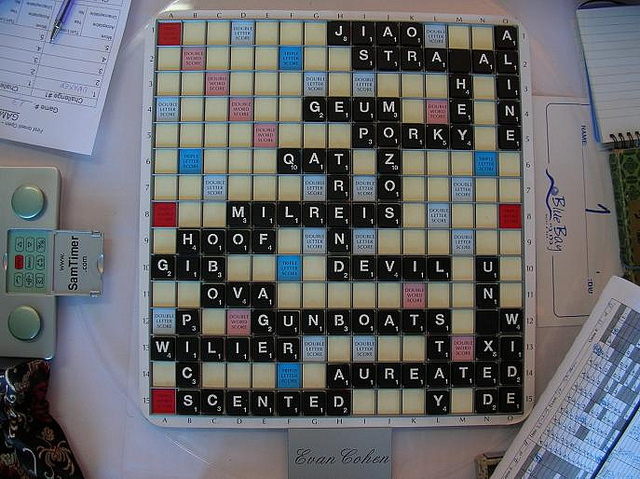Wooden tiles clicking together was the only sound heard during the recent Israeli National Scrabble Championships. Twenty-four people hailing from all parts of the country had come together to do battle with words.
From obscure spelling challenges like ‘crwth’ to ‘aureolae,’ these wordsmiths could cause native English speakers to question whether the language was actually their mother tongue.
While millions of North Americans take part in the worldwide phenomenon of playing Scrabble, the game’s popularity in a non-English speaking country like Israel, where there are nine active Scrabble groups, often surprises those who encounter it.
“The Tel Aviv and Jerusalem clubs are big even by global standards,” says 37-year-old Evan Cohen, winner of the national tournament. “I heard New Zealand has about 200 club players. We have just as many – and we’re not an English speaking country.”
The Jerusalem club is considered the world’s biggest Scrabble club. What it is doing in a city where English, the language of the game, isn’t even an official language, (Hebrew and Arabic are the native languages in Israel), is a question not even the Israel Scrabble Players Association founder could answer.
The late Sam Orbaum, a former columnist with The Jerusalem Post, established the Jerusalem Scrabble Club in 1983. He expected no more than 15 people to turn up at the first meeting. Forty-five showed up. “Every week I wonder why people still keep coming. I wonder if there’s a future for this, then I get 65 people,” Orbaum told this reporter in an interview several years ago, before he tragically succumbed to cancer.
On the third floor of Jerusalem’s Beit Ha’am Municipal Library, some 55 people, equipped with aptitude and obscure vocabularies, come to clack tiles every Tuesday night. More than 51,000 people from all over the world have passed through the capital city club; with hundreds of others having stopped by the country’s other clubs.
In the central region of the country there are four clubs. Of these, Tel Aviv’s league is the biggest, and attracts some two dozen players every Thursday night at a community center located in the heart of the trendy Sheinkin district.
Smaller clubs can be found in Bet Shemesh (founded in the summer of 2005), Herzliya, Modi’in, Eilat, Beersheva, Netanya, and Kfar Vradim.
From native Israelis to North American, European, and North African immigrants to Israel, the clubs attract a mixed bag of word enthusiasts.
At the Tel Aviv club, there are a number of players for whom English is not a first language, reports Cohen.
“We have a lot of younger players at the club which is unusual in the Scrabble scene,” says Cohen, the director and founder of the Tel Aviv Scrabble club. “We attract people from their mid-20s to eighties. Everyone, including the non-English speakers, likes the game and its social aspects.”
The game itself was conceived in 1931 by an out-of-work American architect named Alfred Mosher Butts. Today, the game has annual sales of two million sets in North America, according to the National Scrabble Association (US and Canada). There are some 200 clubs found throughout Canada and the US. There are about 1,000 clubs worldwide. The game has been translated into Hebrew, German, Italian, Spanish, French and Braille. English is the language used by serious players and in tournaments.
“Scrabble refreshes my English and is intellectually stimulating,” said David Ginsberg, a businessman who attends the Modi’in club. “More importantly, it’s social and it’s fun.”
“It’s one of the easiest games to learn how to play. If you’re not into games, forget about Scrabble. But if you want a social game – no matter how bad you are, you’re always good enough to play,” Cohen told ISRAEL21c. “There’s mingling, you always play different people, and it’s extremely good for thinking.”
In a politically charged country like Israel, one would expect political opinions to feature. But players leave their opinions outside. “The most divisive problem we have is not right vs. left, Arabs vs. Jews, Sephardi vs. Ashkenazi or religious vs. secular, but pro- and anti-air conditioner,” the Jerusalem club’s web site declares.
There are several thousand people in the world who compete in English-language Scrabble tournaments around the globe.
Cohen, who recently returned from the World Championships in London, is one of these word whizzes. The best seven-letter word he ever laid down on the board was ‘quixotic’. His favorite word is ‘quincunx’. There are 120,000 words in the official Scrabble (international) dictionary. Cohen says he probably knows how to spell about half of them, while he most likely knows only a quarter of their meanings. One of the little known facts about Scrabble players is that definitions are secondary: this is a tactical game of mental computation.
“It’s not what you know, it’s which high probability words you know,” says Cohen.
Some other words to help you get an edge on your opponent include ‘qat’ (evergreen shrub), ‘cwm’ (steep-walled basin), ‘jiao’ (currency), and ‘xi’ (letter of the Greek alphabet).
Cohen hosts a website for his club and posts on a weekly basis the seven-letter words (called ‘bingos’) played by members.
“There’s not really an aim to the club, we just love the game and get together to play,” sums up Cohen, who started playing Scrabble at the age of nine with his grandmother. “My personal aim is to discover more players and have them progress to an international level of play. We have very good players here, though level-wise our players are not among the strongest in the world.”
From beginners to experts, Israel’s Scrabblers have proven that one doesn’t need English as a first language to meet and share appreciation for a game played by millions around the world.













